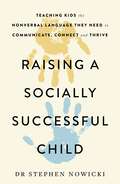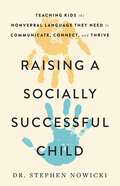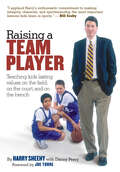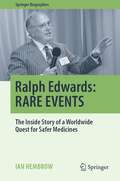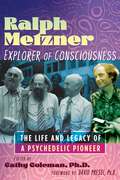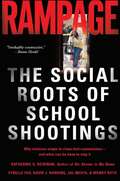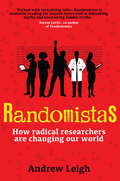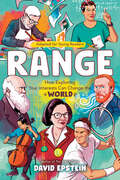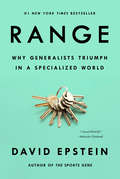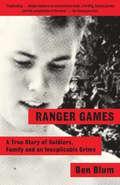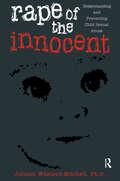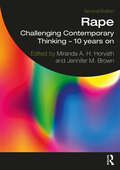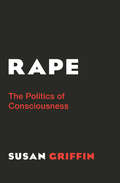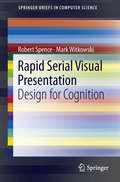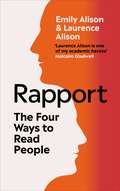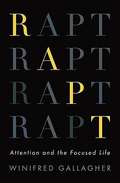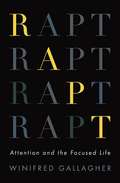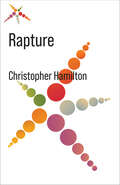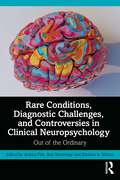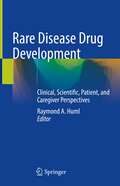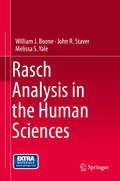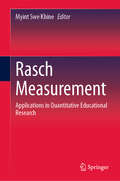- Table View
- List View
Raising a Socially Successful Child
by Dr NowickiWe all want our to children to learn the social skills they need to thrive. Yet many kids are struggling to connect, often with no apparent reason why. What with the steep rise in screen time and the social learning lost to Covid quarantines and school closures, many kids haven't had sufficient opportunity to learn all the rules of nonverbal behaviour.In Raising a Socially Successful Child, Dr. Stephen Nowicki reveals how to identify the non-verbal areas where a child might be struggling, and equips readers with a set of simple exercises for helping any child learn how to:- Follow the rhythm of conversations- Respect the boundaries of personal space- Learn to express and read emotions in facial expressions and body language- Understand the difference between appropriate and inappropriate touch- Sense a person's mood based on their tone of voiceDrawing on decades of research, as well as dozens of case studies, Raising a Socially Successful Child is a much-needed, practical guide to helping children master the non-verbal skills they need to succeed in life.
Raising a Socially Successful Child: Teaching Kids the Nonverbal Language They Need to Communicate, Connect, and Thrive
by Dr. Stephen Nowicki&“A brilliant…and perfectly timed&” (William Stixrud, co-author of The Self-Driven Child) book showing how parents and educators can help children master the nonverbal language of social connection and success We all want our kids learn the social skills they need to thrive. Yet many of today&’s kids are struggling to connect, often with no apparent reason why. In most cases, the explanation is simple: a child hasn&’t fully mastered the nonverbal language of everyday social interaction, like how to take turns in a conversation, how to respect boundaries of personal space, or how to tell whether a friend is feeling happy or sad. And yet, children aren&’t taught nonverbal skills in the same formalized way they are taught reading and writing. Instead, they are expected to absorb these skills at school, home, and on the playground. But between the steep rise in screen time and the social learning lost to Covid quarantines and school closures, today&’s kids have had fewer opportunities to learn the rules of nonverbal behavior. Fortunately, parents and teachers can help kids shore up these essential skills. In Raising a Socially Successful Child, Dr. Stephen Nowicki reveals how to identify the nonverbal areas where a child might be struggling, and equips readers with a set of simple exercises to help any child learn how to: Follow the rhythm of conversations Express and read emotions in facial expressions and body language Understand the difference between appropriate and inappropriate touch Sense a person&’s mood based on their tone of voice And more Drawing on decades of research, as well as dozens of stories from across the country, Raising a Socially Successful Child is the practical guide to helping children master the nonverbal skills they need to succeed in childhood, and their adult lives.
Raising a Team Player: Teaching Kids Lasting Values on the Field, on the Court, and on the Bench
by Joe Torre Danny Peary Harry SheehyIn addition to developing athletic prowess, team sports present a great opportunity for nurturing critical social skills in young athletes. With plenty of advice on bestowing praise, tempering unwanted behavior, and supporting kids and teens on the field, Harry Sheehy shares lessons and wisdom learned from more than two decades of working with young athletes at Williams College and Dartmouth College. Encouraging parents to get involved, Sheehy demonstrates how sportsmanship can help instill important life values that extend beyond the game.
Ralph Edwards: The Inside Story of a Worldwide Quest for Safer Medicines (Springer Biographies)
by Ian HembrowMedical treatments designed to help people can also be harmful or fatal. Around 2.5 million people die this way each year. So if any kind of medicine makes someone unwell, they or their doctor should report it. Those reports, from nearly every country in the world, go to the Uppsala Monitoring Centre (UMC) in Sweden. As the Centre’s first director, Professor Ivor Ralph Edwards transformed it from a tiny operation with limited horizons into an internationally acclaimed scientific organization at the heart of the World Health Organization’s Programme for International Drug Monitoring. He was then succeeded by his wife, Dr Marie Lindquist.This is the story of how a new science developed and a passionate and dedicated pursuit of worldwide medicines safety, with an unerring focus on the welfare of patients. The pioneering work of Ralph, Marie and their collaborators on every continent protected the lives of millions of people. It may yet improve the lives of billions more.
Ralph Metzner, Explorer of Consciousness: The Life and Legacy of a Psychedelic Pioneer
by Cathy Coleman• Includes contributions from Rick Doblin, Charles S. Grob, Stan Grof, Stanley Krippner, Dennis McKenna, the late Christian Rätsch, Richard Strozzi-Heckler, Claudia Mueller-Ebeling, Dorothy Fadiman, Luis Eduardo Luna, and others• Explores Ralph&’s childhood, his time at Harvard with Timothy Leary and Richard Alpert (Ram Dass), his work with Agni Yoga and transpersonal psychology, his development of ecopsychology, and his in-depth psychedelic researchRenowned as a pioneering psychologist, psychedelic elder, alchemical explorer, and shamanic teacher, the late Ralph Metzner (1936–2019) contributed profoundly to consciousness research, transpersonal psychology, and contemporary psychedelic studies across his more than 50-year career.Celebrating the life and legacy of Ralph Metzner, this book explores how Ralph touched the lives of those around him in extraordinary and remarkable ways, recasting people&’s worldviews and inspiring the flowering of creativity, personal growth, and spiritual transformation. There are recollections from the pivotal years of the Sixties, when Ralph conducted research with Timothy Leary and Richard Alpert (Ram Dass). Other contributors describe Ralph&’s involvement in the School of Actualism in the 1970s and the profound impact that Agni Yoga had on Ralph&’s explorations of consciousness and his healing therapies. We also learn about Ralph&’s development of Green Psychology, or ecopsychology, his mystical work exploring prenatal realms of consciousness and channeling, and his healing and transformative &“Vision Circles.&” Academic colleagues and a who&’s who of fellow psychedelic researchers share stories from their work with Ralph, illuminating his depth of knowledge and broad impact. This book paints a complete portrait of Ralph Metzner in his well-known roles as therapist and psychedelic pioneer and as an intrepid explorer of consciousness until the very end of his life.
Rampage
by Katherine S. Newman"In the last decade, school shootings have decimated communities and terrified parents, teachers, and children in even the most "family friendly" American towns and suburbs. These tragedies appear to b"
Random Reflections From An Everyday Sinner
by Bill ClarkRandom Reflections from an Everyday Sinner is a collection of thoughts and reflections about experiencing life from one common man&’s perspective. It speaks of interpersonal experiences in life and the struggles of incorporating belief into a pragmatic and productive world view.The collection of writings are primarily the result of encouragement from my wife, friends, and acquaintances made over a lifetime of extensive work-related travel, Church involvement and general encounters with family members and others navigating through life.&“Experience is the name everyone gives to their mistakes.&” --Oscar WildeThe writings were also therapy. After experiencing the death of parents, 50+ years of working and getting &“retired&” by a corporate takeover and experiencing other common traumas of life, I needed to slow down and readjust my perspective on life. I needed to learn how to stop just reacting and become a better contributor to my own mental health and to the lives of those I encounter.There are a handful of universal truths in these writings. You&’ll know them when you read them. But mostly, this is just a record of experience and opinion. Hopefully you&’ll read these knowing they are intended as encouragement and not as an invitation to philosophical combat. If you disagree with something written here figure out what your position looks like, so you can encourage yourself and others.&“Happy people plan actions, they don't plan results.&” --Denis WaitleyRespectfully,Bill Clark
Randomistas: How Radical Researchers Are Changing Our World
by Andrew LeighA fascinating account of how radical researchers have used experiments to overturn conventional wisdom and shaped life as we know itExperiments have consistently been used in the hard sciences, but in recent decades social scientists have adopted the practice. Randomized trials have been used to design policies to increase educational attainment, lower crime rates, elevate employment rates, and improve living standards among the poor.This book tells the stories of radical researchers who have used experiments to overturn conventional wisdom. From finding the cure for scurvy to discovering what policies really improve literacy rates, Leigh shows how randomistas have shaped life as we know it. Written in a &“Gladwell-esque&” style, this book provides a fascinating account of key randomized control trial studies from across the globe and the challenges that randomistas have faced in getting their studies accepted and their findings implemented. In telling these stories, Leigh draws out key lessons learned and shows the most effective way to conduct these trials.
Range (Adapted for Young Readers): How Exploring Your Interests Can Change the World
by David EpsteinNow adapted for young readers, David Epstein's #1 New York Times bestseller Range is full of inspiring stories of athletes, musicians, artists, and scientists, determining that excellence and expertise is built off of trying many things rather than specializing at a young age.For years, experts have been saying that to become the best at something, one must focus on that skill and only that skill for thousands of hours. But recent research has shown that this school of thought is not necessarily true.In Range, David Epstein carefully examines the world&’s most successful people and discovers that in most fields—especially those that are complex and unpredictable— by far the greatest athletes, artists, musicians, and scientists are those who have garnered a wide skillset beginning at a young age, not those who specialized early in one skill.Carefully adapted for young readers, this book follows inspirational stories of athletes, artists, scientists, and other accomplished adults across many disciplines and provides you with the tools to tap into your limitless potential. How will you expand your range?This is an accessible and fun social sciences book, with fun behind-the-scenes stories of incredible achievers and their accomplishments, perfect for sports fans and those trying to find their path.
Range: Why Generalists Triumph in a Specialized World
by David EpsteinA powerful argument for how to succeed in any field: develop broad interests and skills while everyone around you is rushing to specialize. Plenty of experts argue that anyone who wants to develop a skill, play an instrument, or lead their field should start early, focus intensely, and rack up as many hours of deliberate practice as possible. If you dabble or delay, you’ll never catch up to the people who got a head start. But a closer look at research on the world’s top performers, from professional athletes to Nobel laureates, shows that early specialization is the exception, not the rule. <P><P>David Epstein examined the world’s most successful athletes, artists, musicians, inventors, forecasters and scientists. He discovered that in most fields—especially those that are complex and unpredictable—generalists, not specialists, are primed to excel. Generalists often find their path late, and they juggle many interests rather than focusing on one. They’re also more creative, more agile, and able to make connections their more specialized peers can’t see. <P><P>Provocative, rigorous, and engrossing, Range makes a compelling case for actively cultivating inefficiency. Failing a test is the best way to learn. Frequent quitters end up with the most fulfilling careers. The most impactful inventors cross domains rather than deepening their knowledge in a single area. As experts silo themselves further while computers master more of the skills once reserved for highly focused humans, people who think broadly and embrace diverse experiences and perspectives will increasingly thrive. <P><b>A New York Times Bestseller</b>
Ranger Games: A Story of Soldiers, Family and an Inexplicable Crime
by Ben BlumIn the tradition of Truman Capote and Jon Krakauer, a brilliant exploration of an inexplicable crime and its devastating consequences for the author's family.As a child Ben Blum was a math prodigy adrift in a family of alpha males, foremost among them his first cousin Alex, an immensely popular high school hockey star who had one unshakeable goal in life: endure a brutally difficult training course, become a U.S. Army Ranger and fight terrorists for his country. He succeeded, but on the last day of his leave before deployment, Alex got into his car with two fellow soldiers and two strangers, drove to a local bank in Tacoma and committed armed robbery. The question that haunted Ben, the entire Blum family and even Alex was: Why? Alex didn't need money--his family was well off. He had never had the slightest trouble with the law. He believed passionately in the Ranger's creed, which emphasized honour above all. At first, Alex insisted he thought the robbery was just another exercise in the famously daunting Ranger training program. His attorney presented a case based on the theory that the Ranger indoctrination mirrored that of a cult. Or was it the influence of the soldier who planned the robbery, Alex's superior, Luke Elliott Sommer, a charismatic combat veteran full of swagger and grandiose schemes? Facing his own personal crisis, and in the hopes of helping both Alex and his splintering family cope, Ben delved into these mysteries, growing closer to Alex in the process. As he probed further, he also came to know Sommer, whose manipulative tendencies, combined with a magnetic personality, lured Ben into a relationship that put his loyalties to the test. Intricate, heartrending and morally urgent, Ranger Games is a true crime story like no other. Ben's enormous compassion for his cousin deepens and complicates his search for the answers to profound questions of guilt and innocence, conformity and free will, truth and lies, right and wrong, and how far crisis can stretch the bonds of family.
Rape Of The Innocent: Understanding And Preventing Child Sexual Abuse
by Juliann Whetsell MitchellWritten for mental health professionals, crisis hot line workers, educators and clergy, this resource discusses how to prevent and recognise child sexual abuse and what to do if abuse is suspected. The content covers many settings in which sexual abuse may occur, including the home, day care and group settings. A special section addresses abuse of minority children and those who are handicapped. The author has also included a glossary of terms relevant to the study and prevention of abuse.
Rape: Challenging Contemporary Thinking – 10 Years On
by Miranda A. H. HorvathRape: Challenging Contemporary Thinking – 10 Years On takes stock of current thinking and research about rape and the way it is handled in practice within the criminal justice system, as well as challenging some of the widely held but inaccurate beliefs about rape.The second edition of Rape: Challenging Contemporary Thinking – 10 Years On is not a traditional new edition, although it does provide updated versions of substantive issues covered in the first edition. Bringing the book to the cutting edge, it incorporates both old and new contexts where sexual exploitation takes place, identifying some knowledge gaps especially when considering the voices of complainants/victims/survivors who are invisible or muted, numerous new areas of research including the implications arising from #MeToo and Black Lives Matter movements, the limitations of our present criminal justice systems, and radical alternatives to closing the justice gap. The new book reflects the global reach of research and thinking about rape, including more international coverage, with material from India, the US, Canada, Australia, and New Zealand as well as the UK. In order to learn from our shared history in this field, two authors reflect on their careers and other authors were encouraged to move away from conventional academic formats to convey their stories. Bringing together leading researchers in the field of psychology, sociology, and law, considering new research, and presenting new data from a strong theoretical and contextual base, the chapters are provocative and engage in innovative thinking, whilst remaining grounded in the available evidence.This book is essential reading for students of criminology, forensic psychology, sociology, criminal justice, law, media studies, and women’s/gender studies. It also aims to inform professionals engaged in the investigation, prosecution of rape, support, and preventative services.
Rape: The Politics of Consciousness
by Susan GriffinA powerful feminist examination of the deeply ingrained roots of rape in our shared cultural values Rape is the most frequently occurring violent crime in America. In this courageous, controversial, and groundbreaking work, the poet, feminist, and philosopher Susan Griffin examines rape as an inevitable result of a culture that celebrates and rewards aggressive sexual behavior in men, and one in which male dominance and female submissiveness have long been considered natural. With razor-sharp intelligence, clear-eyed candor, and surprising lyricism, Griffin explores the psychological, historical, political, and societal underpinnings of this devastating act, which cruelly denies a victim her self-determination. By viewing the dark phenomenon of rape through the lens of her personal experience--and through the words of injured parties, writers, legal agencies, and the media--Griffin's powerful discourse is an essential contribution to feminist thought and literature.
Rapid Mental Health Nursing
by Grahame Smith Rebecca RylanceA concise, pocket-sized, A-Z rapid reference handbook on all the essential areas of mental health nursing, aimed at nursing students and newly qualified practitioners. Covers a broad range of mental health disorders, approaches interventions and conditions Easy to locate practical information quickly in a pocket sized, rapid reference format The topics and structure are mapped on to the NMC's (2010) Standards for Pre-registration Nursing Education and their required essential skills and knowledge.
Rapid Psychiatry (Rapid #19)
by Amit Malik Clare OakleyThis pocket guide is a must for all clinical medical students and junior doctors and provides an excellent revision tool in the run-up to exams. It is also perfect for when working on the psychiatric attachment, as it covers many of the conditions encountered on the wards, in clinics, and in general practice. Now thoroughly updated, it includes new sections on Neuropsychiatry, the Psychiatry of Learning Disability, Forensic Psychiatry, and Psychotherapy, as well as common disorders, their assessment and their treatment. Featuring the key points of the Mental Health Act, along with a glossary of terms, Rapid Psychiatry is the ideal refresher, covering just the basic relevant facts.
Rapid Serial Visual Presentation
by Robert Spence Mark WitkowskiA powerful new image presentation technique has evolved over the last twenty years, and its value demonstrated through its support of many and varied common tasks. Conceptually, Rapid Serial Visual Presentation (RSVP) is basically simple, exemplified in the physical world by the rapid riffling of the pages of a book in order to locate a known image. Advances in computation and graphics processing allow RSVP to be applied flexibly and effectively to a huge variety of common tasks such as window shopping, video fast-forward and rewind, TV channel selection and product browsing. At its heart is a remarkable feature of the human visual processing system known as pre-attentive processing, one which supports the recognition of a known image within as little as one hundred milliseconds and without conscious cognitive effort. Knowledge of pre-attentive processing, together with extensive empirical evidence concerning RSVP, has allowed the authors to provide useful guidance to interaction designers wishing to explore the relevance of RSVP to an application, guidance which is supported by a variety of illustrative examples.
Rapport: The Four Ways to Read People
by Laurence Alison Emily Alison'Laurence Alison is one of my academic heroes. He does what every writer longs to do. He makes the difficult clear - without losing his rigour.' Malcolm Gladwell'They are quietly revolutionising the study and practice of interrogation... Their findings are changing the way law enforcement and security agencies approach the delicate and vital task of gathering human intelligence.' GuardianGet what you want from even the most difficult charactersAll of us have to deal with difficult people. Whether we're asking our neighbour to move a fence or our boss for a pay rise, we can struggle to avoid arguments and get what we want.Laurence and Emily Alison are world leaders in forensic psychology, and they specialise in the most difficult interactions imaginable: criminal interrogations. They advise and train the police, security agencies, the FBI and the CIA on how to deal with extremely dangerous suspects when the stakes are high. After 30 years' work - and unprecedented access to 2,000 hours of terrorist interrogations - they have developed a ground-breaking model of interpersonal communication. This deceptively simple approach to handling any encounter works as well for teenagers as it does for terrorists. Now it's time to share it with the world.Rapport reveals that every interaction follows four styles: Control (the lion), Capitulate (the mouse), Confront (the Tyrannosaur) and Co-operate (the monkey). As soon as you understand these styles and your own goals you can shape any conversation at will. And you'll be closer to the real secret: how to create instant rapport.
Rapt
by Winifred GallagherWinifred Gallagher revolutionizes our understanding of attention and the creation of the interested lifeIn Rapt, acclaimed behavioral science writer Winifred Gallagher makes the radical argument that the quality of your life largely depends on what you choose to pay attention to and how you choose to do it. Gallagher grapples with provocative questions-Can we train our focus? What's different about the way creative people pay attention? Why do we often zero in on the wrong factors when making big decisions, like where to move?-driving us to reconsider what we think we know about attention. Gallagher looks beyond sound bites on our proliferating BlackBerries and the increased incidence of ADD in children to the discoveries of neuroscience and psychology and the wisdom of home truths, profoundly altering and expanding the contemporary conversation on attention and its power. Science's major contribution to the study of attention has been the discovery that its basic mechanism is an either/or process of selection. That we focus may be a biological necessity- research now proves we can process only a little information at a time, or about 173 billion bits over an average life-but the good news is that we have much more control over our focus than we think, which gives us a remarkable yet underappreciated capacity to influence our experience. As suggested by the expression "pay attention," this cognitive currency is a finite resource that we must learn to spend wisely. In Rapt, Gallagher introduces us to a diverse cast of characters-artists and ranchers, birders and scientists-who have learned to do just that and whose stories are profound lessons in the art of living the interested life. No matter what your quotient of wealth, looks, brains, or fame, increasing your satisfaction means focusing more on what really interests you and less on what doesn't. In asserting its groundbreaking thesis-the wise investment of your attention is the single most important thing you can do to improve your well-being-Rapt yields fresh insights into the nature of reality and what it means to be fully alive.
Rapt: Attention And The Focused Life
by Winifred GallagherAcclaimed behavioral science writer Gallagher makes the radical argument that the quality of a life largely depends on what and how one chooses to pay attention. "Rapt" yields fresh insights into the nature of reality and what it means to be fully alive.
Rapture (No Limits)
by Christopher HamiltonWhat is it like to experience rapture? For philosopher Christopher Hamilton, it is a loss of self that is also a return to self—an overflowing and emptying out of the self that also nourishes and fills the self. In this inviting book, he reflects on the nature of rapture and its crucial yet unacknowledged place in our lives.Hamilton explores moments of rapture in everyday existence and aesthetic experience, tracing its disruptive power and illuminating its philosophical significance. Rapture is found in sexual love and other forms of intense physical experience, such as Philippe Petit’s nerve-defying wire walk between the Twin Towers. Hamilton also locates it in quieter but equally joyous moments, such as contemplating a work of art or the natural world. He considers a range of examples in philosophy and culture—Nietzsche and Weil, Woolf and Chekhov, the extremes of experience in Werner Herzog’s films—as well as aspects of ordinary life, from illness to gardening. Conversational and evocative, this book calls on us to ask how we might make ourselves more open to experiences of rapturous joy and freedom.
Rare Conditions, Diagnostic Challenges, and Controversies in Clinical Neuropsychology: Out of the Ordinary
by Barbara A. Wilson Shai Betteridge Jessica FishThis book highlights those rare, difficult to diagnose or controversial cases in contemporary clinical neuropsychology. The evidence base relevant to this type of work is almost by definition insufficient to guide practice, but most clinicians will encounter such cases at some point in their careers. By documenting the experiences and learning of clinicians who have worked with cases that are ‘out of the ordinary’, the book addresses an important gap in the literature. The book discusses 23 challenging and fascinating cases that fall outside what can be considered routine practice. Divided into three sections, the text begins by addressing rare and unusual conditions, defined as either conditions with a low incidence, or cases with an atypical presentation of a condition. It goes on to examine circumstances where an accurate diagnosis and/or coherent case formulation has been difficult to reach. The final section addresses controversial conditions in neuropsychology, including those where there is ongoing scientific debate, disagreement between important stakeholders, or an associated high-stakes decision. This text covers practice across lifespan and offers crucial information on specific conditions as well as implications for practice in rare disorders. This book will be beneficial for clinical neuropsychologists and applied psychologists working with people with complex neurological conditions, along with individuals from medical, nursing, allied health and social work backgrounds. It will further be of appeal to educators, researchers and students of these professions and disciplines.
Rare Disease Drug Development: Clinical, Scientific, Patient, and Caregiver Perspectives
by Raymond A. HumlThis book provides a broad overview of rare disease drug development. It offers unique insights from various perspectives, including third-party capital providers, caregivers, patient advocacy groups, drug development professionals, marketing and commercial experts, and patients. A unique reference, the book begins with narratives on the many challenges faced by rare disease patient and their caregivers. Subsequent chapters underscore the critical, multidimensional role of patient advocacy groups and the novel approaches to related clinical trials, investment decisions, and the optimization of rare disease registries. The book addresses various rare disease drug development processes by disciplines such as oncology, hematology, pediatrics, and gene therapy. Chapters then address the operational aspects of drug development, including approval processes, development accelerations, and market access strategies. The book concludes with reflections on the authors' case for real-world data and evidence generation in orphan medicinal drug development. Rare Disease Drug Development is an expertly written text optimized for biopharmaceutical R&D experts, commercial experts, third-party capital providers, patient advocacy groups, patients, and caregivers.
Rasch Analysis in the Human Sciences
by William J. Boone John R. Staver Melissa S. YaleRasch Analysis in the Human Sciences helps individuals, both students and researchers, master the key concepts and resources needed to use Rasch techniques for analyzing data from assessments to measure variables such as abilities, attitudes, and personality traits. Upon completion of the text, readers will be able to confidently evaluate the strengths and weakness of existing instrumentation, compute linear person measures and item measures, interpret Wright Maps, utilize Rasch software, and understand what it means to measure in the Human Sciences. Each of the 24 chapters presents a key concept using a mix of theory and application of user-friendly Rasch software. Chapters also include a beginning and ending dialogue between two typical researchers learning Rasch, "Formative Assessment Check Points," sample data files, an extensive set of application activities with answers, a one paragraph sample research article text integrating the chapter topic, quick-tips, and suggested readings. Rasch Analysis in the Human Sciences will be an essential resource for anyone wishing to begin, or expand, their learning of Rasch measurement techniques, be it in the Health Sciences, Market Research, Education, or Psychology.
Rasch Measurement: Applications in Quantitative Educational Research
by Myint Swe KhineThis book focuses on the use of the Rasch measurement model in validation studies and in analyzing the psychometric properties of a variety of test instruments, questionnaires, and scales in international contexts. It broadly examines the development and application of Rasch modeling, providing in-depth analyses of the properties of various scales used in the fields of education, and humanities and social sciences research.The book includes exemplary works on educational research and practices that highlight recent and innovative applications, as well as theoretical and practical aspects of Rasch modeling. Readers will find it helpful to understand the latest approaches to Rasch measurement in educational research, as well as practices for future studies and quantitative research.'This book provides a diverse set of perspectives on Rasch models from scholars across the globe. The volume is both theoretical and applied. The first section of the book provides an overview of Rasch modeling and explains the theoretical and conceptual framework underlying the Rasch model. The remainder of the book highlights multiple applications of the Rasch model within educational assessment as well as several examples of how Rasch modeling can be used for validation studies. This volume showcases the wide variety of ways in which Rasch modeling can be applied to assessment data to provide insights into students’ achievement and learning and to improve instruction.'–Betsy McCoach, University of Connecticut, USA.'A well-written collection of articles. Grouped by the theoretical and applied aspects of Rasch measurement, each chapter in this edited volume makes notable contributions to knowledge and practice. Written by leading scholars in the field, these chapters were written in a clear, succinct, and assertive manner, providing readers with up-to-date information, analyses, and debates. This book should be found in the core collection of emerging researchers and established scholars in educational measurement.'–Timothy Teo, Murdoch University, Australia.
